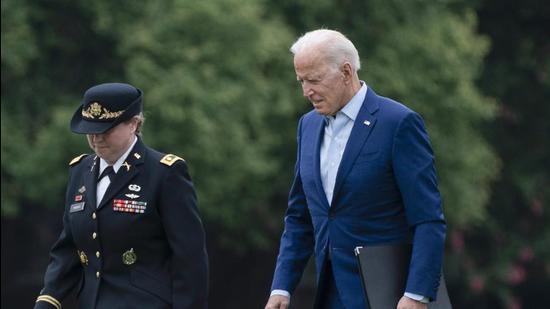When will the US pull back from the real challenge — Pakistan?
Pakistan took American money and backed the Taliban. India is now left with a security nightmare, with implications for Kashmir
In the late 1990s and the early part of the 2000s, there was a graveyard in Srinagar, where only foreign terrorists were brought to be buried. As a reporter, I recall seeing the bodies of men from as far as Sudan; there were also a considerable number of infiltrators killed in military action who had come from Afghanistan.

There is now a specific anxiety of going back to the future in Kashmir.
While much of the world’s attention is focused, with good reason, on the civil liberties of the Afghan people, in particular the medieval treatment of women, girls and religious minorities, for India, the more immediate problem is the management of the security grid.
India’s main challenge then is not Afghanistan. It is an emboldened Pakistan that may seek to resurrect a Pan-Islamist project in the Valley. Islamabad is likely to seek payback from the Taliban for all the years of patronage, funding and operational freedom in Quetta.
How much the Taliban is willing to be puppeteered by Islamabad will determine India’s next moves in Afghanistan. There are varying views on this — from those like Christine Fair who argue that the Taliban is a wholly owned subsidiary of the Pakistani Deep State to others like author-historian William Dalrymple who claims that a Taliban in government could be different from a Taliban on the run.
The Taliban, it is suggested, may also flex its muscle with the Inter-Services Intelligence (ISI). Much will also depend on what happens in the negotiations between Hamid Karzai, Abdullah Abdullah and the Taliban negotiators.
That does not entitle Western nations to insult our intelligence by casting the Taliban as country boys with a code of honour — how the United Kingdom (UK)’s chief of defence staff described them. The dismantling of the West as the fount of geopolitical power is the real story of the Afghanistan crisis.
President Joe Biden’s inept handling of the Afghanistan crisis has demonstrably shown what an unreliable partner the United States (US) is, even in achieving the goals of its own stated war on terror — a battle India was fighting decades before the twin towers were assaulted. The American president may have disrupted the status quo in Kabul with a devastating impact on the world at large and South Asia in particular. But unless there is a similar disruption in Washington’s Pakistan policy — and there are no signs of this at all — the US has just ensured that the world is a much more dangerous place than it was a week ago. And it will be left to India to carry that cross.
From 2002, Pakistan has received $33 billion in aid from the US, of which $14 billion was Coalition Support Funds to combat terrorism in the region. Despite cuts in military funds by the previous Donald Trump administration, successive American regimes have essentially patronised and enabled the Pakistani State’s schizophrenia.
Western dependence on Islamabad for North Atlantic Treaty Organization (NATO) transit routes and other logistics, during the battle for Afghanistan, further enabled Pakistan to set the terms. Effectively, Pakistan has been assisted in the name of combating terrorism, whilst it has been able to channel that assistance into crafting terrorism as a weapon of asymmetric war. It’s like paying the thief to guard your house.
The US has withdrawn from Afghanistan, but a bigger pullback is needed from Pakistan. In the absence of that, it has actually rewarded terrorists and terrorism.
For India, the situation is inflammable and more dangerous than it’s ever been. I take the point made by Army veterans that India in 2021 is not the India of two decades ago, both in capacity and attitude.
But a version of the dreaded two-front war, for which generals have been war-gaming for years, is possibly upon us. In all the focus on Washington and Islamabad, we forget that China hosted a delegation of the Taliban well before it had taken over Kabul.
The China factor, the uncertain, clumsy and wavering US and a recalcitrant Pakistan — these are the realities that India has to confront, at a time when Covid-19 has not been fully defeated and we are still not sure how the third wave might play out.
From a menu of limited choices, India can and should do some things fast — get a political process going in Jammu and Kashmir, where restoration of statehood should not be delayed; keep an informal, tactical line of communication open with the Taliban, despite the revulsion it evokes in most of us; stand with the Afghan people with an open door policy (a good start has been made with the emergency visas); and call out the elephant in the room: America’s Pakistan Policy.
Barkha Dutt is an award-winning journalist and author
The views expressed are personal
All Access.
One Subscription.
Get 360° coverage—from daily headlines
to 100 year archives.



HT App & Website






